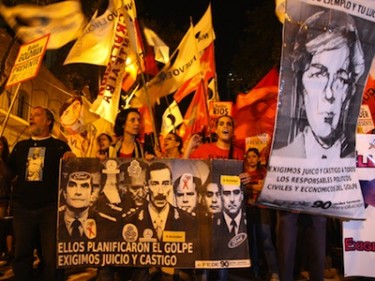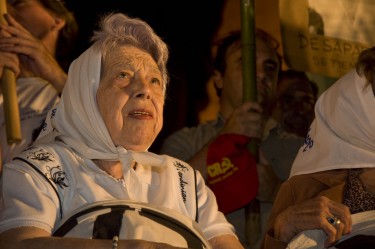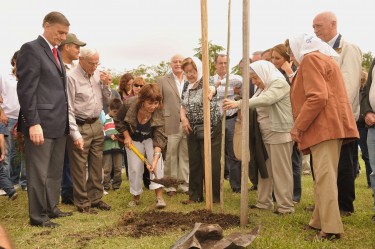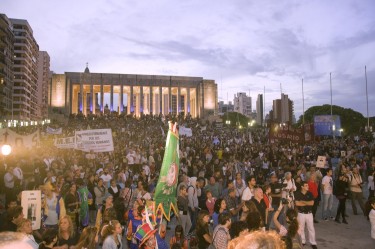35 years after the coup d'état in Argentina, on March 24, 1976, various activities took place across the country. One of the celebrated phrases that summarizes the events that occurred was that of Public Prosecutor Strassera, voiced during the proceedings with the military juntas: “Nunca Mas” [es] (Never again):
Señores jueces: quiero renunciar expresamente a toda pretensión de originalidad para cerrar esta requisitoria. Quiero utilizar una frase que no me pertenece, porque pertenece ya a todo el pueblo argentino. Señores jueces: ¡nunca más!

Argentinians march to Plaza de Mayo, commemorating the victims of the 1976 coup that brought the military junta to power. Buenos Aires, Argentina. Image by Ezequiel Kopel, copyright Demotix (24/03/2011).
In 2006, when a national public holiday was declared, extreme controversies were sparked, since the words “national holiday” are associated with a festive day. In his blog, David Rey11 [es] commented with respect to this:
Lo que va en contra de toda norma del castellano y, asimismo, del sentido común, es que se erija como feriado (repito, “día festivo”) una jornada cuyo saldo histórico sea, supuestamente (según los mismos impulsores), para lamentar, repudiar, marchar, atacar, denostar… El claro ejemplo de esto lo resume el “feriado” del 24 de Marzo
When ex-President Néstor Kirchner presented the project, there was a lot of resistance to passing the law, as Luis Maria Mariano's [es] blog informs us:
Varias organizaciones defensoras de los derechos humanos, habían planteado su resistencia porque consideraban que “feriado” es sinónimo de día festivo y en cuando al golpe militar, hay que recordarlo con “dolor, reflexión y lucha”.
In 2006, Ruben Kotler [es] also shared his reaction to the recently decreed public holiday:
Cuando la semana pasada el gobierno nacional decretó que el 24 se convertiría en un día feriado, cierto escalofrío recorrió mi cuerpo.
Five years have already gone by since the declaration of the national holiday, and this year, along with Thursday, March 24, 2011, they've added on the following day, Friday the 25th, as an extension of the holiday. This has caused the controversy to resurface. Blogger Tucumano in London [es] voices his opinion:
Esta fecha que debería recordarnos lo que “nunca más debería pasar en Argentina”, hoy se ve totalmente desdibujado con un fin de semana largo no laboral para favorecer el turismo.
Nevertheless, not all bloggers agree. In her blog, Agustina Trinidad [es] tells us:
Hoy para muchos es un día que nadie puede olvidar y que cada persona que nace se va enterar, porque como me dijo ayer alguien, “Quien olvida su memoria, esta condenado a repetirla”
The same occurs with Maria Claudia Cambi [es], who in her blog tells the story of Manuel, the son of a missing man who finally discovered his true identity:
Es día de reflexionar sobre la Memoria, la Verdad y la Justicia, sobre las historias épicas y sobre la grandeza de las historias mínimas, individuales.
In Buenos Aires, huge crowds reunited to remember the day in different ways, as shown in the photos of Ezequiel Kopel, Alejo Costa and Patricio Murphy in Demotix. Outside of the capital, other acts took place as well, as in the city of Rosario, for example. On the street of Scalabrini Ortiz, in the presence of the governor of Sante Fe and the mayor of Rosario, the traditional tree planting ceremony was held where the delegation of Mothers of the Plaza de Mayo [es] once took place.
In the afternoon, a multitudinous march started from the San Martin Plaza, in front of the Muesum of Memory [es], and lasted until the National Flag Memorial, bringing together massive groups of people in which different generations intermingled, merging those who lived through the Argentinean military dictatorship with those who know it solely through Argentinean history books.









